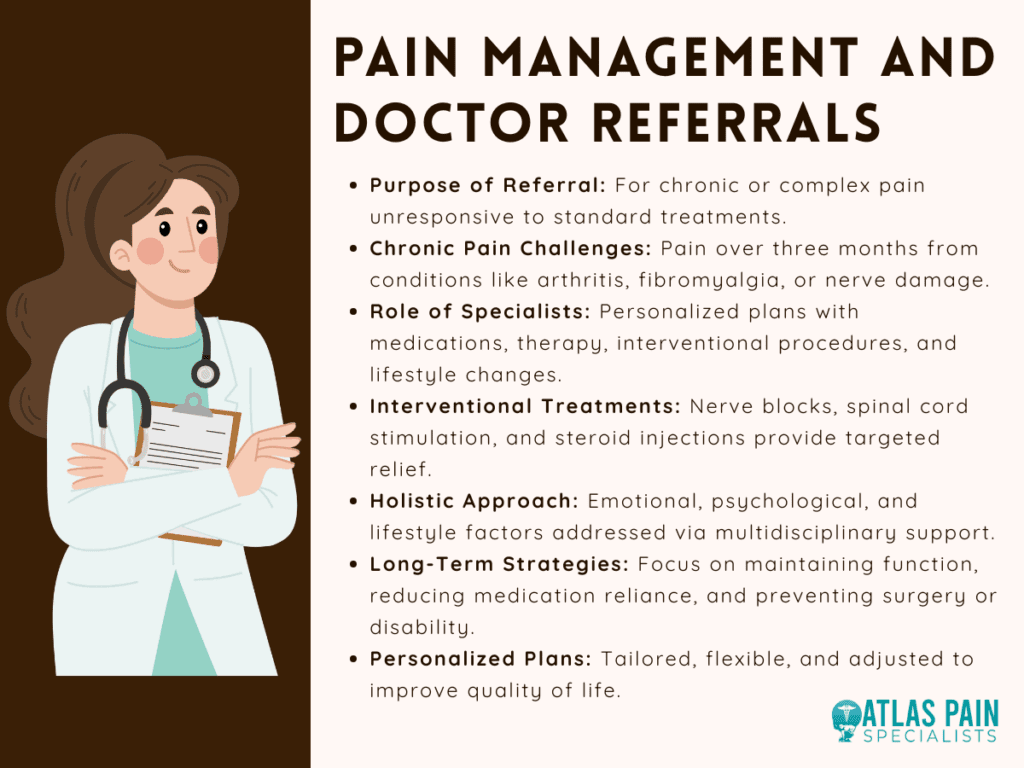

Why Is My Doctor Sending Me to Pain Management?
When patients hear that their doctor is referring them to pain management, it often raises questions and even some concern. Many people are unsure what a pain management specialist does or why such a referral might be necessary.
In reality, this step usually means that your physician wants you to receive more focused care for persistent or complex pain issues. Pain management clinics are designed to address conditions that may not improve with standard treatment and offer advanced therapies.
Pain is not only a physical experience but also one that affects emotional health, work performance, and overall quality of life. Pain management specialists use targeted methods that range from interventional procedures to tailored rehabilitation programs. Why is my doctor sending me to pain management? Let's find out.

Chronic Pain That’s Not Responding to Standard Treatments
One of the most common reasons your doctor might send you to pain management is if your pain has become chronic and is no longer responding to standard treatments. Chronic pain is defined as pain that lasts for more than three months and persists even after the injury or illness has healed.
It can result from various conditions, including arthritis, fibromyalgia, and nerve damage.
Standard Treatments Often Aren’t Enough
When a person first develops pain, common treatments like rest, over-the-counter pain relievers (acetaminophen, ibuprofen), or physical therapy may help. However, chronic pain can often be stubborn, and these initial treatments may lose their effectiveness over time.
For instance, what worked for you in the beginning may not work as your pain becomes more entrenched.
The Role of Pain Management Specialists
Pain management specialists are trained to approach pain from a multi-faceted perspective. When chronic pain persists despite conventional treatments, a pain management specialist will assess your situation carefully and design a comprehensive treatment plan.
This may include a combination of therapies both medical and non-medical that aim to alleviate the pain and restore function. Since each individual experiences pain differently, your pain management specialist will develop a personalized When patients hear that their doctor is referring them to pain management, it often raises questions and even some concern. Many people are unsure what a pain management specialist does or why such a referral might be necessary. In reality, this step usually means that your physician wants you to receive more focused care for persistent or complex pain issues. Pain management clinics are designed to address conditions that may not improve with standard treatment, offering advanced therapies and a multidisciplinary approach.
Pain is not only a physical experience but also one that affects emotional health, work performance, and overall quality of life. A primary care doctor may treat initial symptoms, but chronic or severe pain requires specialized strategies that go beyond basic prescriptions. Pain management specialists use targeted methods that range from interventional procedures to tailored rehabilitation programs. Being referred to one of these clinics is not a dismissal from your doctor but rather an opportunity to receive comprehensive care that prioritizes your long-term well-being.plan for your unique needs.
Managing Complex Pain Conditions
Pain is not always straightforward. Conditions such as fibromyalgia, neuropathy, and complex regional pain syndrome (CRPS) involve complex pain mechanisms that may not be well understood and can be difficult to treat with traditional methods.
Fibromyalgia and Neuropathy
Fibromyalgia, a condition that causes widespread pain and tenderness throughout the body, often comes with other symptoms such as fatigue, sleep disturbances, and difficulty concentrating.
The pain associated with fibromyalgia is often diffuse and can change in intensity over time, making it difficult to treat. Similarly, neuropathy (nerve damage) causes sensations like tingling, burning, or numbness, often in the hands and feet.
These conditions can be incredibly disruptive and require specialized care.
The Complexity of Complex Regional Pain Syndrome (CRPS)
Complex regional pain syndrome (CRPS) is a condition that typically affects an arm or leg after an injury. The pain is often severe and out of proportion to the original injury and can include swelling, changes in skin color, and sensitivity to touch.
Managing CRPS requires advanced pain management techniques to address the abnormal nerve responses and inflammatory processes involved.
Pain Management for Complex Conditions
A pain management specialist is well-equipped to treat these complex conditions with a variety of methods, such as nerve blocks, spinal cord stimulation, and medications that target the nervous system.
They may also incorporate alternative treatments like acupuncture or biofeedback, which help patients manage pain without relying solely on medication. The goal is not just to relieve pain, but to also improve your overall quality of life and functionality.
Interventional Procedures for Targeted Relief
For some people, pain medications and physical therapy alone are insufficient. This is where interventional pain management comes in. Interventional pain management refers to minimally invasive procedures designed to directly target the source of pain, offering more focused and effective relief than oral medications.
Common Interventional Techniques
Some common interventional procedures include:
- Epidural Steroid Injections: These are used to reduce inflammation around the spinal cord and nerve roots. They’re often recommended for conditions like sciatica, herniated discs, or spinal stenosis. The goal is to provide temporary relief, allowing other treatments (such as physical therapy) to be more effective.
- Nerve Blocks: Involves injecting an anesthetic near a nerve to block pain signals. Nerve blocks are commonly used for conditions like migraines, joint pain, or specific nerve-related pain.
- Spinal Cord Stimulation: This technique involves implanting a small device near the spinal cord to deliver electrical impulses, which can block pain signals and help alleviate chronic pain.
Minimally Invasive and Effective
These interventional techniques are often performed under local anesthesia, and recovery times are relatively short compared to surgery. They allow pain management specialists to treat localized pain without requiring large incisions or long recovery periods.
The goal of these procedures is not necessarily to "cure" the pain but to give you significant, lasting relief that improves your ability to function in your daily life.
A Holistic, Multi-Disciplinary Approach
Pain management is not just about using medication to numb symptoms. In fact, a holistic, multi-disciplinary approach is often one of the most effective ways to manage chronic pain.
This approach recognizes that pain affects the whole person not just the physical body and addresses the emotional, mental, and lifestyle components as well.
The Role of a Multidisciplinary Team
Your pain management specialist will often collaborate with other healthcare professionals, including physical therapists, occupational therapists, psychologists, and sometimes even nutritionists.
For example, physical therapy can help you strengthen muscles and improve mobility, while occupational therapy can teach you techniques to perform daily activities with less discomfort.
Psychological Support
Pain can take a heavy toll on mental and emotional health. Chronic pain often leads to depression, anxiety, and frustration.
Cognitive-behavioral therapy (CBT) is a form of therapy that helps individuals develop coping strategies and change negative thought patterns associated with pain.
Pain management specialists will often recommend CBT or other psychological therapies as part of a comprehensive treatment plan to help you manage the emotional and psychological aspects of chronic pain.
Long-Term Pain Management Strategies
Chronic pain isn’t something that can always be eliminated entirely, especially if it’s linked to a long-term condition like arthritis, fibromyalgia, or nerve damage. For this reason, pain management specialists often focus on developing long-term strategies that aim to reduce pain flare-ups and improve your overall quality of life.
Maintaining Function and Mobility
The ultimate goal of pain management is not just to eliminate pain but to ensure that you can continue functioning and enjoying life despite the pain. A pain management specialist will work with you to create a sustainable plan for reducing pain and improving your mobility. This plan might include a combination of exercises, therapy, lifestyle changes, and medication that will allow you to stay active and independent.
Avoiding Dependency on Medication
Another key goal of long-term pain management is to minimize the risk of dependency on pain medications. Many people with chronic pain rely on medications like opioids to manage their symptoms.
However, these medications can be addictive and have side effects. Pain management specialists focus on using the smallest effective dose of medication and may explore other non-medication options to help you manage pain without over-relying on drugs.
Medication Management and Monitoring
If you’re currently taking pain medications, particularly opioids or other potent painkillers, the management and monitoring of these medications becomes an important part of your care. Pain management specialists are skilled in managing medication use to ensure it remains safe and effective over time.
The Importance of Monitoring Medication Use
Pain management specialists are trained to assess the risks of long-term medication use, particularly when it comes to opioid medications, which carry a risk of dependence and other side effects.
They will closely monitor your progress and adjust your medications as necessary to help you maintain an effective pain management regimen. If opioids are part of your treatment plan, they will help you manage your use in a way that minimizes the risk of addiction or misuse.
Exploring Non-Medication Alternatives
In addition to medication, pain management specialists will often recommend non-pharmaceutical treatments, such as acupuncture, massage therapy, or chiropractic care. These alternative treatments can be effective in reducing pain, and they offer valuable options for people who are looking to avoid or reduce their reliance on medications.
Preventing Surgery and Disability
Pain management specialists aim to help you avoid surgery whenever possible, especially if the pain can be controlled through less invasive means. In some cases, untreated chronic pain can lead to disability or the need for surgery, but pain management specialists work to reduce or prevent these outcomes by offering alternative treatments.
Avoiding Surgical Interventions
In some cases, surgery may be the most effective solution, such as with certain types of spinal issues or joint problems. However, a pain management specialist will help you explore all options first, offering treatments that might reduce pain enough to avoid surgery altogether.
Minimally invasive procedures, physical therapy, or medications may be able to manage your pain without the need for invasive surgery.
Maintaining a High Quality of Life
By providing targeted pain relief and treatment strategies, pain management specialists can help prevent disability, allowing you to continue living independently and participating in daily activities. Their goal is to help you maintain a high quality of life, no matter the challenges your pain condition presents.
Personalized Treatment Plans
Each individual experiences pain differently, and effective pain management relies on a highly personalized approach. When you see a pain management specialist, they will work closely with you to create a treatment plan tailored to your specific condition, needs, and lifestyle.
Individualized Care
Your pain management plan will take into account factors like the type and location of your pain, your personal medical history, and your goals for treatment. Whether it involves medications, physical therapy, psychological therapy, or interventional procedures, your treatment plan will be designed to help you achieve the best possible outcome.
Flexibility and Adjustments
Pain management is a dynamic process, and your specialist will regularly reassess your progress and make adjustments to your treatment plan as needed. As your condition evolves or as new treatments become available, your specialist will ensure that your plan stays relevant and effective.
What to Expect from a Pain Management Doctor
When a doctor refers a patient to pain management, it signifies an important step toward specialized care rather than an inability to help. Pain management clinics provide access to advanced treatments, a range of therapeutic options, and expertise.
These clinics focus on long-term solutions, helping patients reduce discomfort, regain mobility, and improve quality of life. A pain management doctor dedicates time to evaluating the full scope of a patient’s condition, considering medical history, lifestyle, and previous attempts at relief.
Patients can expect a detailed consultation in which the doctor listens carefully to their concerns and explains the different avenues of care. A pain management doctor also provides access to a wide range of therapies that can be combined to form a personalized plan.
About Dr. Sean Ormond



